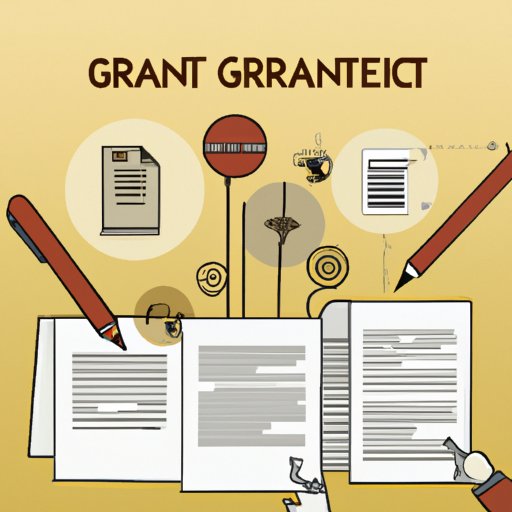Introduction
Grant writing is the process of applying for funding from various sources, including federal, state, local, and private organizations. A successful grant writer must possess strong research and writing skills, an understanding of grant requirements and funding sources, the ability to communicate effectively, and knowledge of grant application processes. This article will provide an overview of the key skills and qualifications needed to be a successful grant writer, the types of grants available, and the grant application process.
Key Skills and Qualifications Needed to be a Successful Grant Writer
To be a successful grant writer, there are certain skills and qualifications that are essential. These include:
- Research and writing skills: The grant writer must have strong research and writing skills in order to identify potential funding sources and craft compelling proposals. They must also be able to present complex information in a clear and concise manner.
- Understanding of grant requirements and funding sources: The grant writer should have a thorough understanding of the requirements and funding sources for different types of grants. This includes an understanding of the different types of grants available, as well as the criteria and eligibility requirements for each type.
- Ability to communicate effectively: The grant writer must be able to communicate effectively with funders and other stakeholders. This includes the ability to understand their needs and present information in a persuasive and convincing manner.
- Knowledge of grant application processes: The grant writer must be familiar with the grant application process, including the steps involved in submitting a proposal and the required documentation.
Types of Grants Available
There are several types of grants available, including federal, state, local, and private grants. Each type of grant has its own set of requirements and eligibility criteria, so it’s important for the grant writer to understand the differences between them.
- Federal grants: Federal grants are typically awarded by the U.S. government to support research, development, and other programs. Examples of federal grants include those from the National Institutes of Health (NIH), the Department of Education (ED), and the Small Business Administration (SBA).
- State and local grants: State and local governments often provide grants to support specific initiatives or projects. These grants can vary widely in size and scope, and may be used to fund everything from educational initiatives to infrastructure projects.
- Private grants: Private grants are typically provided by foundations, corporations, and other organizations. These grants are usually more limited in scope than federal or state grants, but can still be an important source of funding for certain types of projects.
Grant Application Process
Once the grant writer has identified potential funding sources, they must then develop a grant proposal and submit it for review. The grant application process typically involves the following steps:
- Identifying potential funding sources: The grant writer must first research potential funding sources and determine which ones are most likely to support the proposed project. This step requires a thorough understanding of the different types of grants available and the criteria for each.
- Developing a grant proposal: Once potential funding sources have been identified, the grant writer must then develop a grant proposal that clearly outlines the project, its objectives, and its expected outcomes. This step typically involves researching the funder’s objectives and crafting a proposal that meets their needs.
- Submitting the grant application: Once the grant proposal has been developed, the grant writer must then submit the application for review. This step typically involves providing the required documentation and ensuring that all deadlines are met.
Research and Relationship Building
In addition to the grant application process, the grant writer must also conduct research and establish relationships with potential funders. This includes:
- Finding potential funding sources: The grant writer must research potential funding sources, including government agencies, private foundations, and other organizations. This step requires a thorough understanding of the types of grants available and the criteria for each.
- Establishing relationships with funders: The grant writer must also strive to build relationships with potential funders. This can involve attending meetings, networking events, and other activities to get to know the funder and demonstrate their commitment to the project.
Crafting Compelling Grant Proposals
Once the grant writer has found potential funding sources and established relationships with them, they must then craft compelling grant proposals. This requires:
- Understanding the funder’s objectives: The grant writer must thoroughly research the funder’s objectives and tailor the proposal to meet their needs.
- Writing a clear and concise proposal: The grant writer must present complex information in a clear and concise manner. This step involves organizing the proposal into logical sections and using simple language to explain the project and its objectives.
- Demonstrating need for funds: The grant writer must also demonstrate why the project is worthy of funding. This can involve presenting data on the project’s expected impact, describing the project’s relevance to the funder’s mission, and showing how it will benefit the community.
Conclusion
Grant writing is a complex process that requires strong research and writing skills, an understanding of grant requirements and funding sources, the ability to communicate effectively, and knowledge of grant application processes. For those looking to become successful grant writers, this article provides an overview of the key skills and qualifications needed, the types of grants available, and the grant application process. With the right skills and qualifications, anyone can become a successful grant writer.
(Note: Is this article not meeting your expectations? Do you have knowledge or insights to share? Unlock new opportunities and expand your reach by joining our authors team. Click Registration to join us and share your expertise with our readers.)
